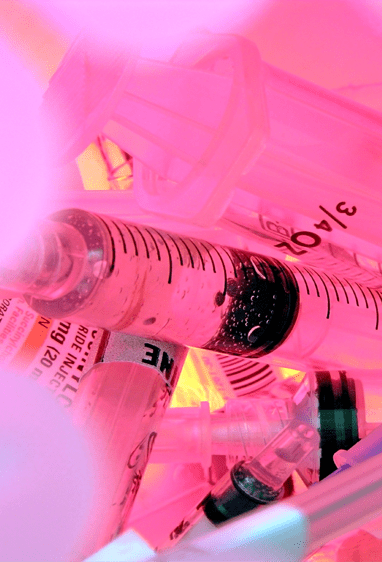It’s a fact that injecting drug users inject drugs in public washroom facilities. They then have to dispose of the needle in the cubicle – invariably there is no safe disposal method so the only options are; place in a feminine hygiene unit, try and flush it down the toilet or just leave it lying around! Someone else is then faced with handling a potentially dangerous “sharp”.
So, this is a very interesting question, and a potentially controversial issue, the answer to which is not simple because different people will have different perceptions of promoting safe sharps disposal in public washrooms.
On the one hand, does having a disposal system encourage greater awareness for health & safety when using potentially dangerous sharps (injecting diabetics for instance) in public washrooms. Or does providing a disposal unit give the green light to people who use sharps to partake in harmful recreational activities to use the washroom more often?
It’s a difficult one.
You can argue that not providing a safe method of disposal does nothing to discourage addicts using public toilets for their activities and the waste will simply be discarded in a manner that puts the public, cleaners and hygiene companies at risk.
Providing a sharps unit in the cubicle will undoubtedly encourage safe disposal but what message does it send out to other users of the washroom? Do thoughts automatically turn to illegal activities on those premises, forgetting the millions of users of sharps for self administered medical purposes?
Table of Contents
What are sharps and what are they used for?
‘Sharps” is the medical term used to describe devices with sharp points and edges that are able to puncture or cut the skin. Examples of these include:
- Needles – hollow needles used to inject drugs (medication) under the skin.
- Syringes – devices used to inject medication into or withdraw fluid from the body
- Lancets, or “finger stick” devices – instruments with a short, two-edged blade used to get drops of blood for testing. Lancets are commonly used in the treatment of diabetes.
- Auto Injectors, including epinephrine and insulin pens – syringes pre-filled with fluid medication designed to be self-injected into the body
- Infusion sets – tubing systems with a needle used to deliver drugs to the body.
- Connection needles/sets – needles that connect to a tube used to transfer fluids in and out of the body. This is generally used for patients on home hemodialysis.
A great example of successful public sharps disposal implementation is the initiative taken in Belfast in 2015, when needle bins to allow drug injecting drug users to safely dispose of used syringes were installed in 5 public toilets in Belfast city centre. The council stated that their reasoning for taking this measure was due to the number of needles being found by cleaners and members of the public. The initiative was welcomed by a former injecting drug user who said:
“It’s a safe place to dispose of any sharps so there’s no debris left around in toilets and public places – it’s really quite a progressive move,” he said.
“I think people have this image of injecting drug users as dangerous criminals, and we’re not.
“We’re just normal people who use drugs and we want to keep people as safe as possible.
“Our drug addiction is our own, and if we can protect the general public from harm then that’s a very positive thing.”
Sharps disposal containers in public restrooms for syringes have been proven useful in Belfast as part of government policies surrounding harm minimisation. By providing receptacles for diabetics and addicts to dispose of their used syringes, it helps to eliminate the risk of the general public being harmed or infected. But could this be perceived as the Government raising the white flag to drug users? Is regulation safer and more effective than control?
It seems that sharps disposal bins in areas with known widespread usage of drug abuse could prove a smart decision, but will this plant the seed for drug users to inject more often in public areas, and if so what are the possible implications of this and can it be managed?
What do YOU think?
For more information on the Governments guidance and good practice when tackling drug related litter, visit defra.co.uk
What Does This Mean for Businesses?
A recent story about a mother in South Shields who found her 7-year-old daughter picking up a used needle in a bathroom in fast food outlet is every parent’s nightmare and clearly illustrates the dangers posed to innocent victims and the dangers of inconsiderate sharps disposal.
So should every business have a sharps disposal unit in their washroom?
Citron Hygiene also offer a collection service for the waste containers from your business premises to ensure a totally safe, reliable and managed service.
Learn more about how Citron Hygiene can help to keep your business’ washrooms safe from sharps.
